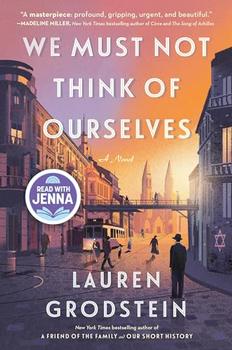Summary | Excerpt | Reading Guide | Discuss | Reviews | Beyond the Book | Readalikes | Genres & Themes | Author Bio

Critics' Opinion:
Readers' Opinion:
First Published:
Nov 2023, 304 pages
Paperback:
Oct 29, 2024, 320 pages
 Book Reviewed by:
Book Reviewed by:
Kim Kovacs
Buy This Book
Seventeen
The next evening, Filip strutted into the apartment with two large bags of chicken feet that he had traded for somewhere on the outside. He had recently turned twelve and was starting to grow; perhaps his prosperity as a trader had provided him with the requisite calories for a proper growth spurt, or perhaps the human body would do what it was designed to do even in the most absurd of circumstances. Either way, he was a good ten centimeters taller than he'd been when we'd met, and his shoulders had started to broaden. His voice was changing too, becoming deeper. I noticed it especially when he practiced his English with me. In English, he sounded almost like a man.
"I'll trade you four feet for next week's lesson," I said. (The going price for English lessons was three zloty or, lately, whatever the children's families could spare; I had no idea what the going rate was for chicken feet, since chicken was not legal for purchase in the ghetto.)
"I risked my life for these," he said; he said it casually. "But I'll give you a discount. Four for five zloty."
"That's highway robbery," I said. "Those are just feet!"
Filip shrugged. "You hungry?" He'd grown nervy.
I sighed. My satchel was on the counter; I reached in and handed him his zloty. He plucked four feet out of one of his bags and handed me the skinny, clawlike things. They were fresh, with feathers on their anklebones and needlelike nails on the ends of the toes. They looked, frankly, disgusting. But you could boil them for a while and then fry them, and they would make an edible snack. When I was a child, we ate them frequently when my father was deployed and his government subsidy disappeared in the mail.
"So what's it like right now on the outside, anyway?" I said, using an old kitchen knife to pare the claws off the feet.
"Better than here," he said, watching me work with an expression of mild amusement. "But still not great." His hair was growing in thicker than it had been before he'd shaved it for typhus, and darker too. This had happened to my own hair when I was his age; fine blondish wisps had become the coarse brownish-blondish curls that Kasia used to trim by the sink.
"How so?"
"People seem hungrier," he said, "and there's less in the shops. There are more beggars in the streets, and the Germans beat them up or take them away in police vans. There are still rich people, though. You can see it in the way they dress. They still have cars, jewelry. They're still shopping."
"Any news of the war?" Filip shrugged. It was one of the luckiest aspects of youth, this ability to be nonchalant. "I don't know, really. I saw some headlines in the newsstand that the Germans are proceeding to Moscow, but it might be propaganda. They have a lot of the same news outside that they do in here."
I sighed and scraped at my chicken. Our contraband transistor had updated us with the same news, German troops mowing down Russians like they were so many toy soldiers, but it was hard to know if this was the truth. Occasionally, we would get a blessed crackle of British news, but this, too, felt like propaganda: The Germans were on the retreat; they had underestimated the number and relentlessness of the Russians. And now that Stalin was awakened to the danger of Hitler, the Russian bear would roar. But how could all this be true at the same time, that the Russians were winning and losing, that the Germans were decimating the Soviets and losing three hundred Panzer tanks a day? It was all paradox, nonsense. And so we waited in our hot and crowded apartment, stinking, sweating, hungry, waiting for deliverance and unable to know the direction from which it was coming.
"I did hear that the Germans captured Minsk," Filip said, after a minute.
"Yes," I said. "I heard that too."
Filip removed his whittling knife from his shirt pocket and a stick from his bag and began whittling, idly, his motions matching mine. We worked with our knives in several minutes' silence.
Excerpted from We Must Not Think of Ourselves by Lauren Grodstein. Copyright © 2023 by Lauren Grodstein. Excerpted by permission of Algonquin Books. All rights reserved. No part of this excerpt may be reproduced or reprinted without permission in writing from the publisher.




The only completely consistent people are the dead
Click Here to find out who said this, as well as discovering other famous literary quotes!
Your guide toexceptional books
BookBrowse seeks out and recommends the best in contemporary fiction and nonfiction—books that not only engage and entertain but also deepen our understanding of ourselves and the world around us.